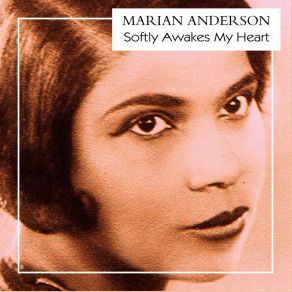Softly Awakes My Heart
Download links and information about Softly Awakes My Heart by Marian Anderson. This album was released in 1999 and it belongs to Gospel, Pop, Opera genres. It contains 15 tracks with total duration of 52:21 minutes.

|
|
|---|---|
| Artist: | Marian Anderson |
| Release date: | 1999 |
| Genre: | Gospel, Pop, Opera |
| Tracks: | 15 |
| Duration: | 52:21 |
| Buy it NOW at: | |
| Buy on iTunes $9.99 | |
| Buy on Amazon $4.36 | |
Tracks
[Edit]| No. | Title | Length |
|---|---|---|
| 1. | Heav'n Heav'n (I Got a Robe) | 2:15 |
| 2. | Deep River | 2:39 |
| 3. | I Don't Feel No Ways Tired | 2:12 |
| 4. | Carry Me Back to Old Virginny | 3:57 |
| 5. | Ave Maria | 4:45 |
| 6. | Plaisir D'amour | 3:36 |
| 7. | O Death from Thy Powers | 3:31 |
| 8. | Softly Awakes My Heart | 4:48 |
| 9. | Let Us Break Bread Together | 1:49 |
| 10. | Sometimes I Feel Like a Motherless Child | 3:23 |
| 11. | Oh! What a Beautiful City | 2:09 |
| 12. | My Old Kentucky Home | 3:46 |
| 13. | Adieu Forets | 3:40 |
| 14. | Air DE Lia | 3:45 |
| 15. | O Mio Fernando | 6:06 |
Details
[Edit]Living Era's tribute to Marian Anderson is composed of recordings she made between August 1928 and June 1946. This portrait album is divided into various "chapters" representing different aspects of the European classical repertoire along with two distinct sections made up of what were then referred to as traditional Negro spirituals. Marian Anderson's life and work occurred within a specific social context; because of her African ancestry she was refused admission to the Philadelphia Academy in 1923. In 1925 racism temporarily stymied her career even after she won a competition involving 300 other contestants in New York. Beginning in 1927 Anderson toured through Russia, Austria, Germany, Sweden, Switzerland, France, Belgium, Spain, and England. She performed at New York's Town Hall in 1935 and at Carnegie Hall in 1936; after receiving an honorary degree from Harvard University in 1938, Anderson was invited to the White House to sing for President Franklin D. and First Lady Eleanor Roosevelt. Although internationally recognized as a phenomenally gifted artist and honored at home as a national treasure, Marian Anderson's African ancestry caused consternation among the bigoted elite in the United States of America. In 1939, certain members of the Daughters of the American Revolution essentially celebrated the tenth anniversary of the construction of their prestigious Constitution Hall by denying Anderson the right to perform there. Eleanor Roosevelt resigned her membership in protest of their ignorant vulgarity and made certain that Anderson was treated with the respect that she deserved by arranging for this divine woman to sing instead at the Lincoln Memorial.
Living Era's overview of Marian Anderson's musical legacy reflects the rich diversity of multiple traditions; in addition to Afro-American sacred songs and Stephen Foster's "My Old Kentucky Home," the multilingual Anderson performs arias from Giuseppe Verdi's Don Carlos and Camille Saint-Saëns' Samson and Delilah; she presides over powerful passages from J.S. Bach's St. Matthew Passion and G.F. Handel's Messiah as well as a treasure trove of beautiful lieder by Franz Schubert, Robert Schumann, Johannes Brahms, Sergei Rachmaninov, J.P.A. Martini, and (in Swedish) Jean Sibelius. Anderson's voice moved through tonal regions rarely traveled by other singers; it is a mystery realm that exists somewhere between the mezzo-sopranos and the altos. Ewa Podles seems to have been born there, and Mitsuko Shirai visits regularly, as did Jan DeGaetani and Arleen Auger from time to time. There is something disarmingly visceral and true to life about the way these women emanate Spirit. Anderson, like Podles, is capable of creating an arrested moment in eternity during which the rest of the cosmos might better stop and listen, as her marvelous voice seems to originate somewhere deep within invisible recessed realms. The word "contralto" hardly does justice to this magical wavelength. Spend an hour listening to Marian Anderson — her voice will transform you.